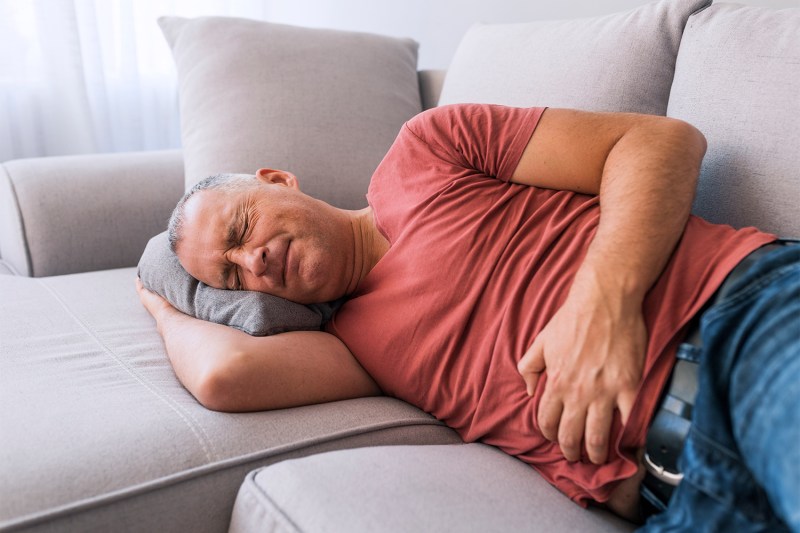
Travel constipation is a real thing — and if you’ve ever experienced it, you know how uncomfortable it can be. Whether you’re traveling for work or pleasure, feeling backed up can make for an unpleasant travel experience. Straining to go or feeling bloated during travel can make it hard to fully enjoy your experience and leave you in a pretty sour mood. Despite how common travel constipation is, most people don’t understand why it occurs or what to do about it.
Getting ahead of your travel constipation before it occurs can help you feel your best and enjoy your trip. In this guide, we’ll explore the most common reasons for constipation when traveling and what you can do to help prevent it before it happens.

Reasons for constipation when traveling
Constipation while you’re away from home can be caused by several different factors. Often, it’s a combination of multiple factors that stray from your normal routine that can leave you backed up while on vacation. Even if you’re on a regular bathroom schedule at home, travel could leave you feeling constipated and uncomfortable.
Lack of movement
Exercise is one important factor in keeping your bowels moving regularly. Moving around helps to lower the amount of time it takes food to travel through the large intestine. In turn, this limits the amount of water that the body absorbs from the stool. Since travel often involves prolonged periods of sitting, such as on long plane rides, this lack of movement can cause trouble in your bowels. Especially for people who exercise on a routine, the lack of movement during travel can lead to some serious constipation.
Less water intake
Dehydration during travel is common, too, which can worsen your constipation. Not consuming enough water will slow down the movement of waste through your intestines and worsen constipation. In general, people tend to consume less water while traveling for a variety of reasons. First and foremost, you might not have access to as much water as you’d normally drink at home, such as during a multiple-hour plane ride. Or perhaps you’re trying to drink less fluids so you don’t have to use the bathroom on the plane.
Lack of exercise also might cause you to drink less water than you would normally. Plus, the changes in altitude or climate (depending on the location of your travel) can play a role in worsening dehydration, too.
Dietary changes
One of the best parts about travel is the opportunity to try new foods and explore exciting restaurants. As great as this sounds, it also means you may be consuming types of cuisines or foods you don’t normally eat. You may be eating more processed foods than you eat at home, consuming less fiber, and eating at different times or in different quantities than you do on a typical day at home. If you’re consuming alcohol as you travel, this can also impact your digestive health.
Schedule changes
Travel days can be hectic and leave little time for you to try to go to the bathroom without feeling rushed. In turn, you may be left feeling constipated simply because you haven’t had time to relax and try to go. Going to the bathroom in a public restroom is not quite the same as relaxing in the comfort of your own home.

How to overcome travel constipation
Once you understand why you get constipated during travel, it’s easier to proactively take steps to prevent constipation. Addressing travel constipation before it occurs is the best way to maintain regular bowels and feel your best as you travel.
Drink more water
Hydration is essential for passing bowel movements and keeping stools soft enough to pass comfortably. During your trip, actively pay attention to your water intake and strive to consume more water than you normally would at home. Traveling with hydrating electrolyte packets that can be mixed into water can also help fight against constipation by providing essential minerals like magnesium and potassium.
Consume high-fiber foods
Eating out for every meal during travel might mean you’re not consuming enough fiber. Actively choosing high-fiber foods and snacks can help fight constipation before it occurs. For snacks, choose foods like apples that contain high amounts of healthy fiber instead of packaged and processed snacks that worsen constipation. Choosing vegetables that contain fiber during restaurant meals can help too.
Move around
It’s not always easy to find time to exercise when traveling. If your schedule allows, sticking to your normal exercise routine as best as possible can also help fight travel constipation. Starting your day with a simple walk or jog or hitting the hotel gym can help stimulate the urge to go. This tip is especially important for people who regularly live very active lives.
Take magnesium citrate
Magnesium citrate pills are easy to find online or at any local grocery store or pharmacy. This specific type of magnesium works as an osmotic laxative, which means it pulls water into the intestine and helps to relax the bowels. The water drawn into the stool helps make it softer and easier to pass. Taking one of these pills daily can help you to keep regular and fight constipation before it happens. However, start slow until you find the best dose for you, as taking too much magnesium citrate could leave you with diarrhea.



